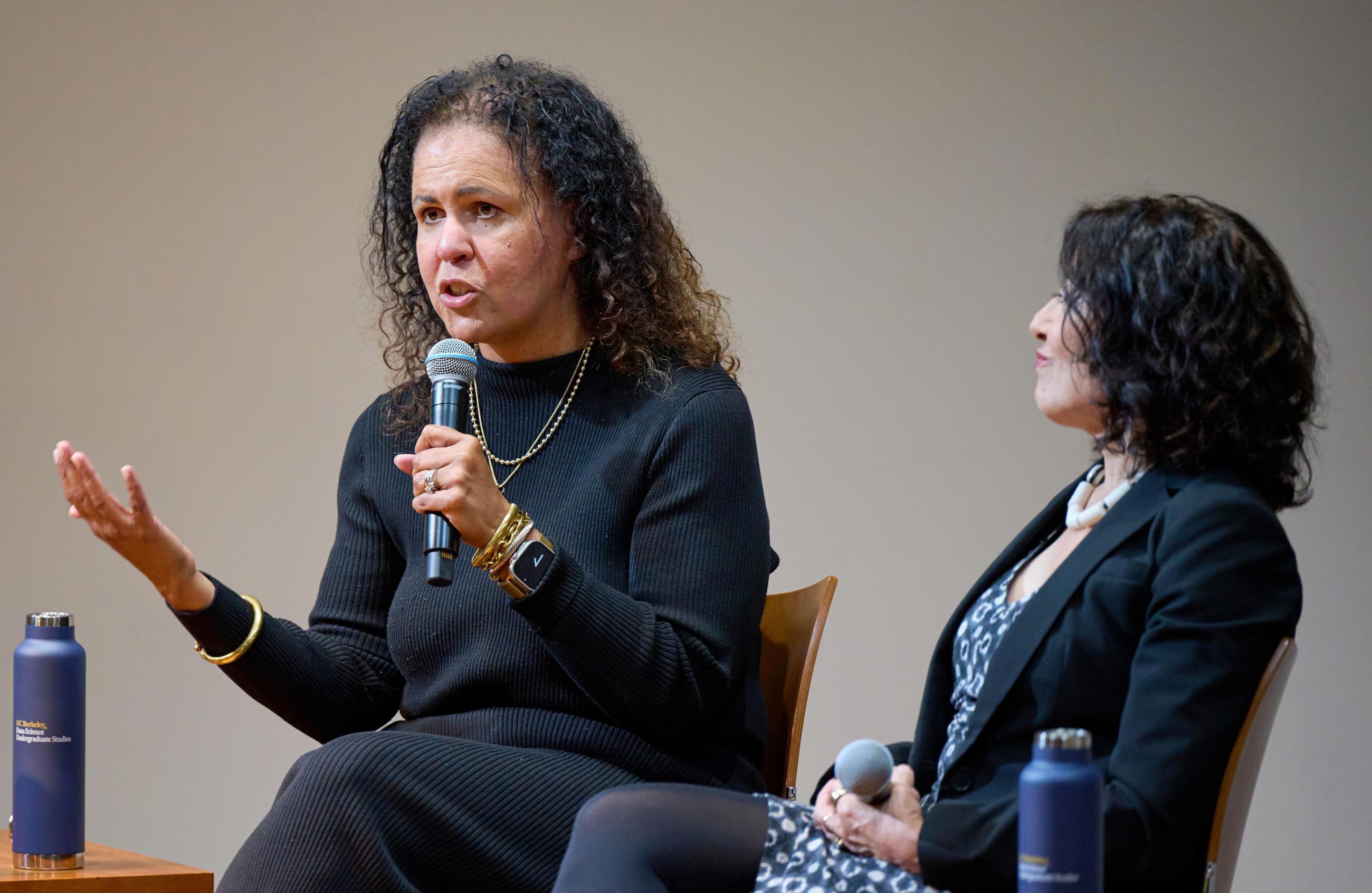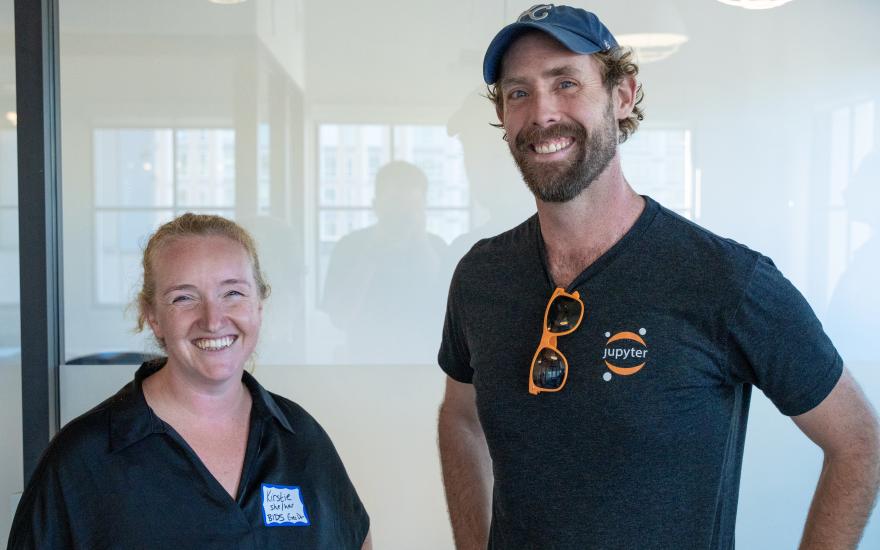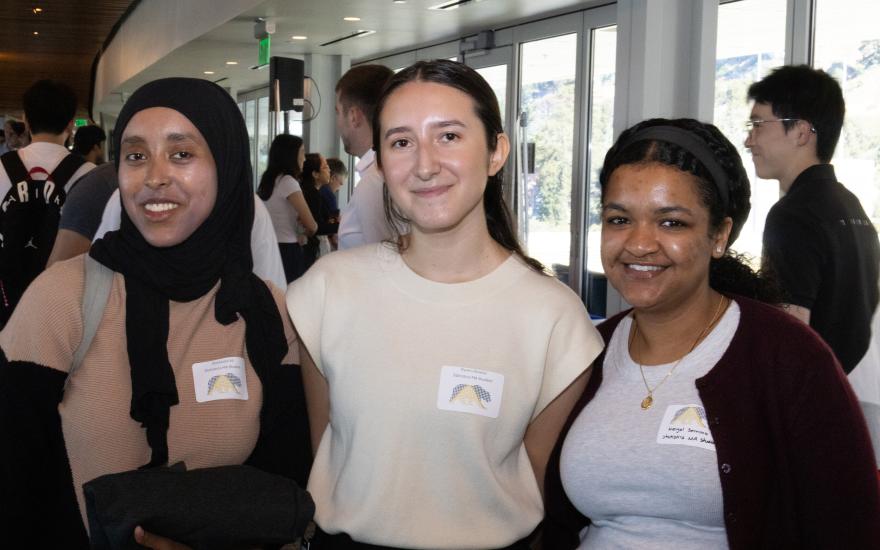
Safiya Noble joins Jennifer Chayes in a discussion about bridging AI and humanity during the National Workshop on Data Science Education at the UC Berkeley campus on June 24, 2025. (Photo/ KLC fotos/ Marcus Edwards)
A recent discussion at the National Workshop on Data Science Education illustrated the value of open conversation about the impact of AI on humanity.
Safiya Noble, an internet studies scholar, social scientist and UCLA professor, joined Jennifer Chayes, dean of the UC Berkeley College of Computing, Data Science, and Society (CDSS), during a June 24 afternoon session on the Berkeley campus. Meredith Lee, head of strategic partnerships at CDSS and chief technical advisor to Chayes, moderated the discussion.
Their wide-ranging conversation considered the importance of critical thinking and interdisciplinary education, and the need for open systems to expand access to, and participation in, the development and use of AI technologies.
The National Workshop on Data Science Education was started in 2017 by Berkeley’s Data Science Undergraduate Studies program. The June 2025 workshop gathered approximately 200 educators in person and online who teach data science at institutions across California and beyond to discuss curriculum, learn about each other’s programs, and help shape instruction at the undergraduate level.
Protecting public institutions and education
Noble and Chayes’ discussion ended the workshop’s second day, which was focused on AI in teaching and education. Both speakers stressed the need to protect public institutions, foster resilient students, and envision a future where AI is used to benefit communities and society instead of exacerbating existing inequality.
“I’m concerned about the loss of our public institutions under this current government,” said Noble. “If we don't have a UC Berkeley or UCLA, or the community colleges, or the [California State Universities], or any number of colleges, universities, K-12, libraries, museums, public knowledge institutions, I think we have a lot at stake.”
Noble talked about writing her 2018 book, “Algorithms of Oppression: How Search Engines Reinforce Racism,” at a time when some were suggesting that internet search technologies had made colleges and universities irrelevant.
“Hold on,” she recalled at the workshop session. “Let's talk about what those institutions are, what they contribute, and how a search engine cannot be a replacement for them.”
Reflecting on AI systems in society
“We're in another kind of similar fast-forward moment around generative AI, and it's really important that we slow down the conversations,” said Noble, the David O. Sears Presidential Endowed Chair of Social Sciences at UCLA and a professor of gender studies, African American studies, and information studies.
“While we're talking about things like deepening student learning, we also are seeing the massive rise of generative AI systems manipulating people,” she said.
“I think it's the moment for prosocial tech, and there are a lot of possibilities that could have been for those of us who have been around computing for a long time,” Noble continued. “With the knowledge that we have now, what would we go back and do differently? This moment of generative AI, in particular, is the moment to bring that reflexive way of thinking and imagining.”
Chayes agreed on the need for reflection but cautioned that slowing down the technology may not be possible. “I do not believe we are putting this [AI] genie back in the bottle in any way,” she said. “I believe it is out and and I believe it is also distributed power, or it should be a distributed power.”
“To the extent that we can, we should educate individuals to think critically, to interrogate these systems to come with a perspective of ‘how am I being manipulated, or how could I be manipulated?’ Teaching that critical thinking is essential for everyone at every level of education,” Chayes said.
'Focus on people and communities first'
Noble and Chayes also reflected on their career journeys and how early experiences continue to inform their perspectives on social and technical issues.
“As a teenager, I can remember thinking: who would ever want to sit at a computer all day when we could just be out in the streets and on the phone?” said Noble. As a sociology major at California State University Fresno, Noble said she was always thinking about computers and how she used them in relationship to people.
“At [the UCLA Center for Resilience and Digital Justice], we focus on people and communities first,” said Noble. “That's actually what I care about first. And then to what degree does computing enhance our human agency and the human experience, or diminish it? To me, that's where the most interesting research and other kinds of intellectual questions are.”
Chayes mentioned participating in public demonstrations against war as a child. “Probably 15 years of my career [as a mathematical physicist] were spent trying to not make my technology any part of the real world, so that it couldn't hurt anybody,” said Chayes. “And understanding as I engaged more, and kind of fell into the tech industry, how central the social piece was.”
“For me, there's been this journey where there's always this part of me that gets very excited by the technology. I can’t help it,” Chayes admitted. “Then constantly asking: how do we reconnect this to society and build it in a connected way, if we can? And how do we reconnect it when forces are breaking that connection?”






